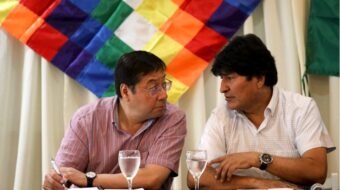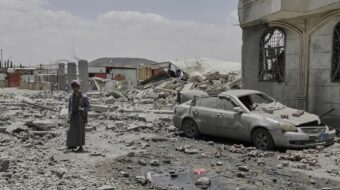News Analysis
A major storm is brewing between two of South America’s most important countries, and the Bush administration seems to be exploring how to use it for its own ends.
On Dec. 13, rogue elements of the Venezuelan police and National Guard kidnapped Rodrigo Granda, the chief of foreign relations for the Revolutionary Armed Forces of Colombia (FARC), in downtown Caracas, and spirited him across the border into Colombia where he is under arrest.
The FARC is the larger of the two main left-wing guerilla movements in Colombia, and has been battling the Colombian government and right-wing paramilitaries for decades. While the U.S. and Colombian governments regard the FARC as a terrorist group, many people in South America see it as a legitimate popular guerrilla force fighting to reverse the vast inequalities and injustices that characterize life in modern Colombia.
Despite its preoccupation with terrorism, the Bush administration has turned a blind eye to the Colombian government’s de facto alliance with right-wing paramilitaries, who constitute one of the most brutal armed forces in the world and who are responsible for the deaths of thousands of innocent civilians, not to mention massive drug dealing.
At first, spokespeople for right-wing Colombian President Alvaro Uribe, Bush’s closest ally in Latin America, claimed that they actually had captured Granda on the Colombian side of the border, but ultimately they admitted to bribing Venezuelan security officials to make the grab.
Leftist Venezuelan president Hugo Chavez reacted cautiously at first. Although Chavez won a popular mandate last summer for his program of radical social reforms, he has no reason to want to quarrel openly with Colombia, with which Venezuela has extensive trade.
He has other reasons to be cautious. Chavez is extremely unpopular with the Bush regime because he befriended socialist Cuba, opposed the so-called Free Trade Area of the Americas, and proposed closer economic cooperation among the countries of Latin America as a way to combat dependency on the U.S. and on the major international lending institutions (IMF and World Bank).
In 2002, the CIA helped organize and promote a military coup against Chavez, which failed because most of the population and important elements of the Venezuelan armed forces refused to go along with it. More recently, the U.S. helped finance a recall referendum against Chavez, which also failed miserably.
The U.S. gets a considerable proportion of its petroleum from Venezuela, and thus is motivated to intervene to establish a pro-U.S. administration in Caracas. Part of the U.S. war of nerves against Venezuela is to accuse Chavez of being a supporter of the Colombian guerrillas.
Moreover, in spite of having won his referendum, Chavez faces dangerous internal opposition, including major elements of the security forces and a large proportion of the media, which work 24-7 to undermine his government.
However, public opinion in Venezuela was aroused when it became clear that a foreign power had carried out such a blatant violation of Venezuela’s independence. The Venezuelan Communist Party and other groups normally supportive of Chavez issued strongly worded demands that the government act in defense of Venezuelan national sovereignty.
On Jan. 14, Chavez withdrew Venezuela’s ambassador from Bogota and announced the suspension of a number of economic cooperation activities between the two countries, while demanding an apology from Colombia.
President Uribe refused to apologize and denounced Granda’s presence in Venezuela, calling him a terrorist with whom no country should have dealings or host. On Jan. 15, the U.S. ambassador to Colombia, William Wood, expressed “100 percent support” for Colombia’s position, claiming that the FARC had said that the Venezuelan government had authorized Granda’s presence in Caracas.
Chavez then accused the U.S. of trying to exploit the situation for “divide and conquer” purposes, specifically to throw a monkey wrench into efforts to create a Latin American trading bloc as a substitute for the FTAA. The Venezuelan president said, “It would be just too much that a government comes out and supports the crime [of kidnapping Granda], assuming a conduct very similar to that of the United States, which bombards and invades peoples without respecting anybody’s sovereignty.”
At press time, the door was left open by both sides to president-to-president talks to resolve the dispute.









